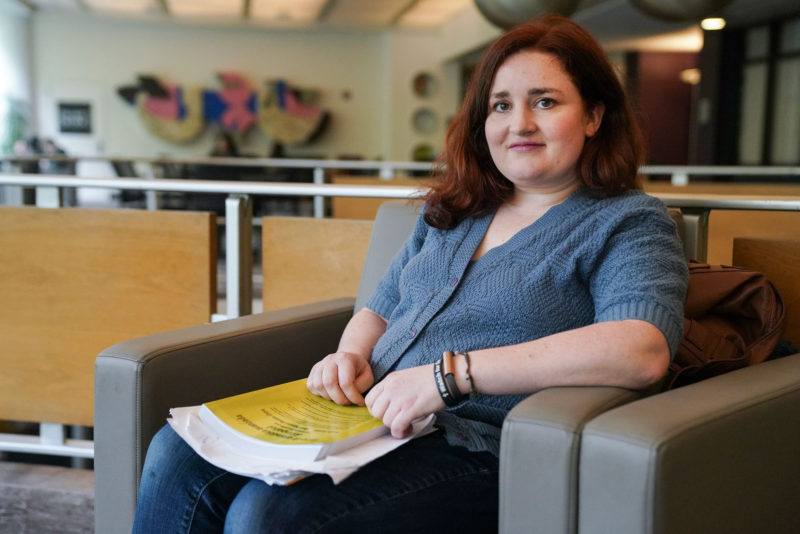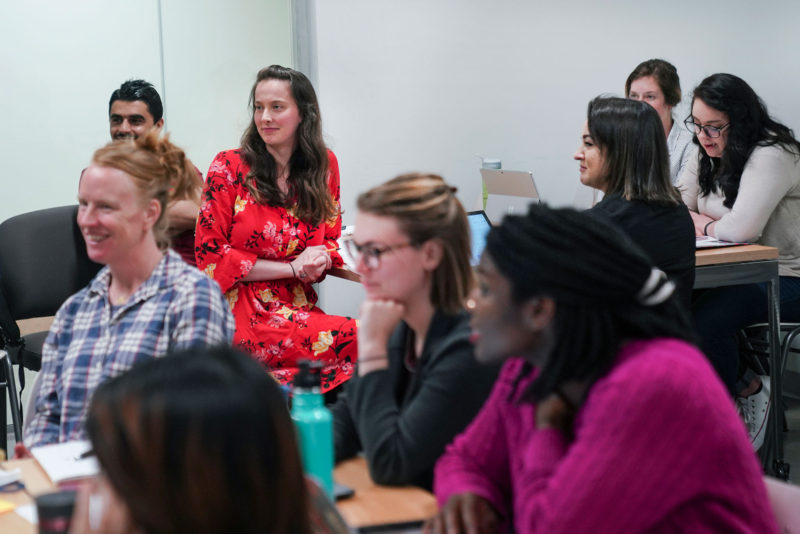Universities that are recruiting older students often leave them floundering

A day-care center at Portland State University. Twenty-two percent of the students at the university are parents — half of them raising kids alone.
PORTLAND, Ore. — Under gray skies, smiling 8- and 9-year-olds in shiny raincoats skip across the Portland State University campus. Infants and toddlers are napping in the student center.
These aren’t necessarily child prodigies. They belong to students who have come to college later in their lives than traditional undergraduates.
Twenty-two percent of the 28,000 students at the university are parents — half of them raising kids alone. Sixty-eight percent work at least part time and 44 percent full time or more, 1,500 are military veterans, and almost two-thirds have transferred from somewhere else. The average age is 27.
Woven into the city’s downtown, where several bus and trolley lines converge, Portland State provides them with child care, family-friendly study lounges and commencements, lactation rooms, a streamlined transfer review process, emergency short-term loans and instructors who understand the time constraints of parents and other nontraditional-aged students who have outside jobs and financial obligations.
“It would be harder at a traditional university because there are sort of expectations like that after school you can just go home and do this project and tomorrow have it ready,” said Jade Souza, a 36-year-old divorced mother of three who is close to getting her bachelor’s degree, in Spanish language and literature.
“Here the professors understand that for a lot of students that’s not the case so they’re structuring things so there’s a little flexibility. They’re not assuming that you’re going straight home. They’re assuming you might have to work after this.”
Yet at a time when universities nationwide are aggressively recruiting students like Souza, who face a myriad of obstacles traditional-aged students don’t, the kind of help she’s gotten on this campus is more of an exception than the rule.
“A lot of institutions will assume that these adults will just make changes in their lives in order to adjust to the educational institution’s structure and design,” said Rebecca Klein-Collins, associate vice president for research at the Council for Adult and Experiential Learning. “They don’t understand that they as institutions need to make adjustments.”

Jade Souza, a 36-year-old mother of three who is getting her bachelor’s degree at Portland State University. Faculty there “are not assuming that you’re going straight home. They’re assuming you might have to work after this.”
With the number of 18- to 24-year-olds down and expected to remain flat through at least 2035, according to the U.S. Census Bureau, older students make up an increasingly important market for universities and colleges. More than 35 million Americans over 25 have some college credits, but never got degrees, the Census Bureau says — a huge pool of potential customers.
Twenty-nine percent of undergraduate and 77 percent of graduate students are 25 or older, the U.S. Department of Education reports, belying the stereotype that every college campus is populated by 18-year-olds who live in dorms or fraternities and go to football games on Saturdays.
Among these older students, more than half are parents, according to the Institute for Women’s Policy Research. Two-thirds have low incomes, compared to 36 percent of their traditional-aged classmates. Fifty-seven percent work at least 20 hours a week, versus 39 percent of younger students. And 44 percent, compared to 19 percent of traditional undergrads, enroll part-time.
These characteristics add extra challenges to the already stressful experience of college. The biggest is balancing work and school, one survey of older-than-traditional-age community college students found. Then comes paying expenses and meeting the demands of family, the survey, by the consulting firm Percontor, showed. There are also frustrations about such things as parking, registering for courses and dealing with faculty the students don’t think care about them, don’t respond to emails or aren’t available outside of class.
Meanwhile, colleges have collectively reduced, not increased, the availability of campus child care; the average campus daycare center has a waiting list of 80 children.
Then come less visible headaches. Souza worries about limits on absences, for instance, because “between me and my three kids it’s inevitable somebody is going to be sick.” She’s also sensitive to the differences between herself and younger classmates, most of whom weren’t born when she earned her first college credits in 1999, while she was still in high school, before having her first child at 17 and putting her education on hold.

Danielle Ridgeway, a 36-year-old mother of two, is a business major at Portland State University. She was “a little hesitant, definitely,” to come back. “I don’t want to waste any more money. I don’t want to waste any more time.”
“The sense that you’re an outsider and that you don’t belong can be really strong,” said Souza.
Many Americans for whom these impediments await are already reluctant to go back to college after having had bad experiences the first time. “It may have taken them years to build up the confidence to try again. If they end up enrolling at a place that does not have structures in place to serve who they are at this point in life, the adult student is going to feel again like they’ve somehow failed — that, ‘I’ve not been able to make this work and it’s my fault,’” said Klein-Collins, author of “Never Too Late: The Adult Student’s Guide to College.”
“It’s not their fault. The problem is that they chose the wrong institution.”
Danielle Ridgeway, a 36-year-old student in the business school at Portland State, started at 18 but “didn’t get a whole lot of support from advisors. I kind of got lost in the system, changed majors four times, just trying to figure out what I wanted to do [and] took a lot of courses I didn’t need.” After five years, she said, she still didn’t even have enough of the right credits to get an associate degree.
She was “a little hesitant, definitely,” to come back, said Ridgeway. “I don’t want to waste any more money. I don’t want to waste any more time. I just wanted to get the degree I want in an appropriate amount of time.”
Now she balances her courses with raising two children, 5 and 9, and working full-time as marketing manager for a construction company.

Zac Mckinster, 28, a Navy veteran and new father, is double-majoring in finance and quantitative economics at Portland State. “You’d think it could be simpler,” he says.
Often, Ridgeway said, “I’m just counting down: ‘Okay, we’re at week four, we’ve got seven more to go” in Portland State’s 11-week quarters. “If I can make it this 11 weeks, I can make it the next 11 weeks.” There have been “a lot of tears. A lot of meltdowns.” Especially when her children ask her, “‘Do you have to do homework tonight? Can’t we just go play?’”
She also encounters other, less poignant reminders that she’s older than her classmates.
In her study group, she said, “I’m taking notes and they’re, like, ‘Where are you taking notes?’ ‘On a piece of paper.’ ‘Why aren’t you typing them out on a Google doc?’ ‘Because I’m old school and I like to write it out.’” As the oldest member of the business school’s Future Leaders Group, she said, “Sometimes it is a little bit harder to relate as they’re talking about the things that are going on in their life. I’m, like, ‘Yeah, well, I have a job and bills. I have kids, I can’t just go to all of the social events you kids are doing.’ It does get a little hard and you do kind of feel like an outsider.”
Another problem also stops many older students from finally getting all the way through college: paying for it. State financial aid is often not available to people over a certain age or past a certain number of years after graduating from high school. Federal Pell Grants are limited to the equivalent of six years. Once veterans begin cashing in their GI Bill benefits, they’re good for 36 months of education.
Even though he’s taken more than the usual number of courses each semester and gets an extra year of GI Bill benefits because of a disability — hearing loss from when he worked on the flight deck of an aircraft carrier — “I’m going to be right up against my deadline,” said Zac Mckinster, 28, a Navy veteran double-majoring in finance and quantitative economics at Portland State. “There’s not a whole lot of wiggle room.”
These constraints are made worse for older students who try to transfer credits they’ve already earned and paid for; more than 40 percent of previous academic credits aren’t accepted, according to the Government Accountability Office, and some of those that are don’t count toward students’ majors. This means students have to take the same subjects again, while their eligibility for financial aid trickles away.

Kristie Kolesnikov, in red, spent 10 years getting her bachelor’s degrees at six different institutions. The mother of two can’t even keep track of how many credits she lost every time she changed majors or transferred. Now she’s working toward a master’s degree.
Kristie Kolesnikov, 30, spent 10 years getting her bachelor’s degrees at six different institutions while raising a son — she now also has a 19-month-old — and doesn’t even know how many credits she lost every time she changed majors or transferred. “That’s a bummer,” said Kolesnikov, now working on her master’s in public administration at Portland State. “And that’s what happens.”
Not surprisingly, older students often give up. Of those who enroll at the age of 24 or over, nearly half drop out within six years, the National Student Clearinghouse Research Center reports. Even at Portland State, the proportion of students who finish in six years is 47 percent compared to the national average of 58 percent.
“We’re missing the real problem, which is we have to put a system in place so students can actually graduate,” said John Mullane, a counselor at a Connecticut community college and president of College Transfer Solutions. “We need fundamental change on our campuses and we’re not getting that.”
That’s not only bad for students; it hurts universities that need more of them, and the revenue they bring, said Yohlunda Mosley, Portland State’s assistant vice president for enrollment management.
“If a student comes to a campus and they’re not retained, and they leave that campus with debt,” said Mosley, “how do you then go back into that community and recruit more?”
This is among the reasons Portland State, which was established in 1946 to serve veterans, has added such supports as a program under which students who have attended other institutions can learn, before they enroll, whether their credits will transfer. In addition to its walk-in and reserved-space child care centers, it has family-friendly study rooms with toys, books (“The Toddler’s Busy Book,” “I Love Dirt!”), diapers and baby wipes along with coffee and computer terminals for parents. Recent student body presidents have included a mother of two and a 32-year-old former Army combat medic.
Even here, there are limitations. Campus offices aren’t open in the evenings or on weekends, for example. Academic credit is available for relevant professional and personal experience, but not until after students are enrolled and have completed at least one course, and there is typically a test required and a fee charged that can’t be covered by financial aid. As at many large universities, there’s not a single central source of information for older students — though one is under consideration.

Lisa Wittorff, director of services for students with children at Portland State University, where 22 percent of the students are parents — half of them raising kids alone.
“If they don’t happen to go into Financial Aid when they’re running out of financial aid, they’re just, like, ‘Oh, I’m out of financial aid I guess I have to quit,’” said Lisa Wittorff, director of services for students with children. “They don’t know what services might happen to be available.”
Like college students of all descriptions, those who are older than the traditional age are baffled by the general complexity of higher education. “You’d think it could be simpler,” said Mckinster, a new father. For people like him, that adds “a ton of stress,” he said.
Kolesnikov knows people mean well when they ask her, “How do you do it all?” she said. “A better response to somebody is, ‘How can I further support you?’”
A few other institutions are offering answers to that question. St. Clair County Community College in Michigan has a special fund to cover such emergency expenses for its older students as rent payments, car repairs and babysitting. Wayne State University forgives past-due balances of $1,500 or less, of former students who didn’t graduate and want to come back. Kent State University has a designated Center for Adult and Veteran Services, which helps process benefits, coordinates campus services and brings together older learners who have more in common with each other than with younger classmates.
Fordham runs a dedicated School of Professional and Continuing Studies for older undergraduates, with evening, weekend and online classes and up to 75 transfer credits offered and as many as 30 for prior personal and professional experience. California State University Long Beach offers a bachelor of arts in the liberal arts for working adults, with both in-person and online classes, and its student government includes a representative for parents and pregnant students and another for veterans.
Universities that want to enroll these students, have to provide at least a minimum of help, Klein-Collins said. “Just the basics are classes in the evening or blended options where you can do some online on your own time. Then you’ve got other things, like rolling term starts, so you don’t just offer a program that starts in September and January, but you can start at different times of the year.”

Portland State University, where the average age of students is 27 — including military veterans, parents, and people who work full time. With the number of older students growing, the university is one of only a few that offer targeted support for them.
She said she counsels older students that, “If an institution is not providing a certain level of service for you or making it easy for you to fit them into your busy life, then keep looking. Not every institution has really figured that piece out yet, and I don’t know if they’re willing to change.”
There are other signs of movement. Before 2017, increasingly popular free-college programs universally excluded older students. Starting in the fall, Tennessee made them eligible for free community college, with some restrictions, and five other states are now working on doing the same thing, according to the National Association of Student Financial Aid Administrators. Also in the fall, Idaho began to offer a $3,500-a-year scholarship for adult learners returning to school to finish their degrees.
But universities in general “are not responding with these kinds of strategies” — despite the fact that most enrollment growth is projected to be among older, online and graduate students — said Tim Culver, vice president in charge of retention services at the consulting firm Ruffalo Noel Levitz.
“What they’re trying to do is attract the adult student with the same program they provide to the traditional student. And the message [these students] are getting is, ‘We would like to have you but we want you to conform to the traditional product. We want you to buy the same product the traditional-age students are buying.’”
As an older student with kids, Jade Souza hears another message.
When well-intentioned people tell her that she must be superhuman to juggle so much in her life, she said, “It’s really heartbreaking” to her. “Because I know everything has a cost. And this idea that [student parents] are superhuman is not true.”
Said Souza: “People’s grades are suffering or their work is suffering or their kids are suffering. I would like to see it not that way — that students could do what’s more within the range of human limits of time and space.”
The post Universities that are recruiting older students often leave them floundering appeared first on The Hechinger Report.
Last Updated on 27 November 2024
We cover inequality and innovation in education with in-depth journalism that uses research, data and stories from classrooms and campuses to show the public how education can be improved and why it matters.





